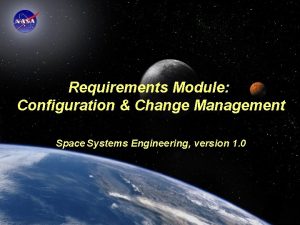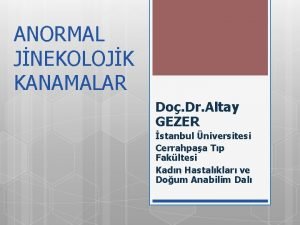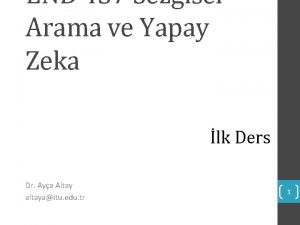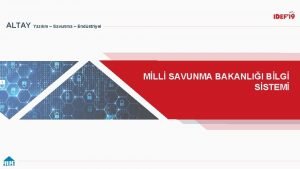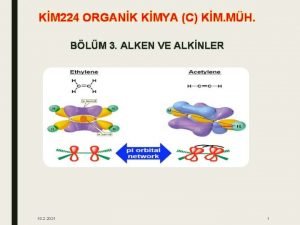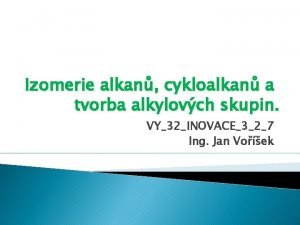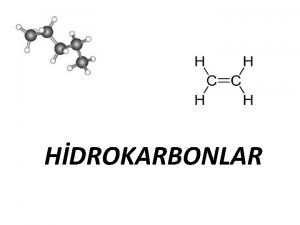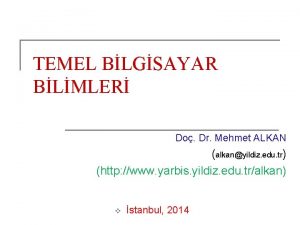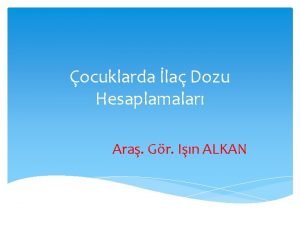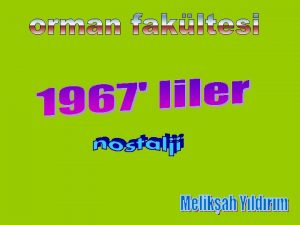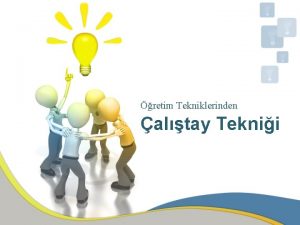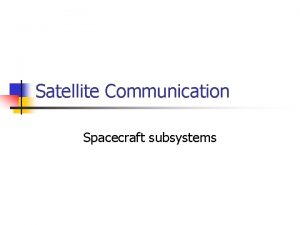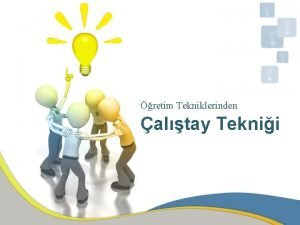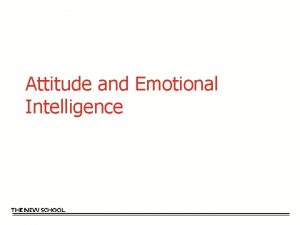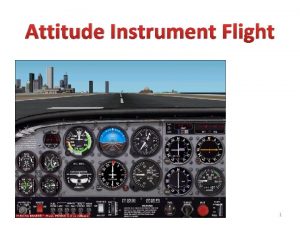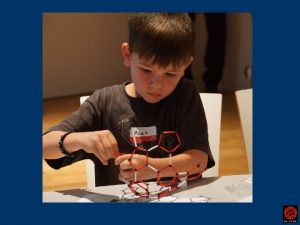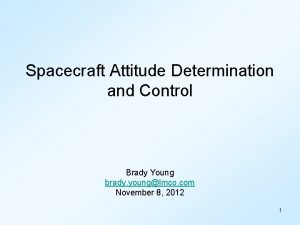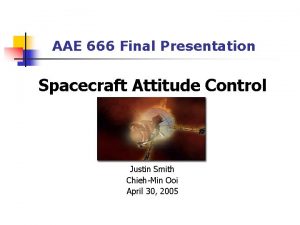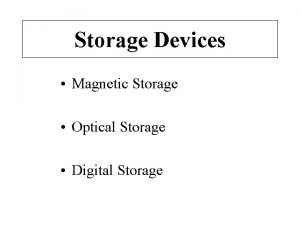Spacecraft Energy Storage and Attitude Control Alkan ALTAY







![Simulation of a S/C Equipped With IPACS Spacecraft Inertias (kgm 2) [15, 10] Initial Simulation of a S/C Equipped With IPACS Spacecraft Inertias (kgm 2) [15, 10] Initial](https://slidetodoc.com/presentation_image_h/07021f564457a152a072a78e2a7b82e8/image-8.jpg)



- Slides: 11

Spacecraft Energy Storage and Attitude Control Alkan ALTAY TUSAŞ Aerospace Industries Inc. Assoc. Prof. Dr. Ozan TEKİNALP Middle East Technical University Aerospace Engineering Dept. 2 nd International Conference on Recent Advances in Space Technologies, June 09 -11, 2005, İstanbul, TÜRKİYE

Energy Storage in LEO Spacecrafts Electrochemical Battery Packs 2 nd International Conference on Recent Advances in Space Technologies, June 09 -11, 2005, İstanbul, TÜRKİYE

Attitude Control in LEO Spacecrafts Control Moment Gyroscope ( CMG ) 2 nd International Conference on Recent Advances in Space Technologies, June 09 -11, 2005, İstanbul, TÜRKİYE

Integrated Power and Attitude Control IPACS - VSCMG A Variable Speed CMG ( VSCMG ) That Stores Energy IPACS 2 nd International Conference on Recent Advances in Space Technologies, June 09 -11, 2005, İstanbul, TÜRKİYE

IPACS - VSCMG 2 nd International Conference on Recent Advances in Space Technologies, June 09 -11, 2005, İstanbul, TÜRKİYE

Conceptual Design Calculations Small Spacecraft Requirements Energy Storage ( Wh ) 100 Number of Charge/Discharge Cycles 30, 000 Torque Capacity ( Nm ) 0. 025 Angular Momentum Capacity (Nms ) 6 Number of Attitude Actuators 4 IPACS-VSCMG Design Parameters FW 1 FW 2 Reaction Wheel Design Battery Parameters CMG Design Parameters Max Wheel Electro. Chemical Speed (k. RPM) 30 60 FW 3 a 240 Angular Momentum Capacity Operating Speed (RPM) 15000 Max. Wheel Speed ( RPM ) Ni-Cd Li-Ion 5000 1. 9 15. 3 7. 7 (Nms) Max. Gimbal Speed (rad/s) 0. 1 Energy Maximum Density Torque (Wh/kg) (Nm) 35 110 0. 015 Max Torque (Nm) 1. 74 0. 87 0. 22 Output Torque (Nm) 0. 22 Depth of Momentum Angular Discharge Capacity ( Nms 20 %) 0. 9375 20 3. 4 % Do. D Maximum Angular Momentum Energy Density (Wh/kg) Capacity (Nms) 5. 0 a 1. 9 8. 3 25. 0 fails structurally 2 nd International Conference on Recent Advances in Space Technologies, June 09 -11, 2005, İstanbul, TÜRKİYE

Comparisons Electric Power System Advantages Of IPACS Uncoupled energy storage and power capacity More Charge/Discharge Cycles FW - 240 FW - 60 FW - 30 CMG + Li-Ion CMG +Ni-Cd RW + Li-Ion RW + Ni-Cd Long Life High Charge/Discharge Rates Deterministic State of Charge Attitude Control System Advantages of IPACS Large Control Torques Total Mass Comparison For Energy Storage and Attitude Control System Combinations Large Momentum Storage Low Vibration (for Magnetic Bearing) 2 nd International Conference on Recent Advances in Space Technologies, June 09 -11, 2005, İstanbul, TÜRKİYE
![Simulation of a SC Equipped With IPACS Spacecraft Inertias kgm 2 15 10 Initial Simulation of a S/C Equipped With IPACS Spacecraft Inertias (kgm 2) [15, 10] Initial](https://slidetodoc.com/presentation_image_h/07021f564457a152a072a78e2a7b82e8/image-8.jpg)
Simulation of a S/C Equipped With IPACS Spacecraft Inertias (kgm 2) [15, 10] Initial Orientation of S/C (deg) [0, 0, 0] Skew Angle, β (deg) 54. 73 IPACS-VSCMG FW 2 (60 k. RPM) Initial Flywheel Spin Rates (k. RPM) [35, 40, 45, 50] Initial Gimbal Angles (deg) [110, -125, 110, -125] 60 deg of roll maneuver is expected from the spacecraft while energy is being drawn from the IPACS-VSCMGs 2 nd International Conference on Recent Advances in Space Technologies, June 09 -11, 2005, İstanbul, TÜRKİYE

Simulation Results - Smooth Maneuvering Capability - Both Attitude and Power Objectives Satisfied - Uncoupled Power and Attitude Functions 2 nd International Conference on Recent Advances in Space Technologies, June 09 -11, 2005, İstanbul, TÜRKİYE

Simulation Results - We are able to follow any desired spin rate profile - Low gimbal rates due to the high angular momentum content 2 nd International Conference on Recent Advances in Space Technologies, June 09 -11, 2005, İstanbul, TÜRKİYE

Future Work The Solution To The Kinematic Singularity Problem : Application of “Blended Inverse” Building A Prototype ? 2 nd International Conference on Recent Advances in Space Technologies, June 09 -11, 2005, İstanbul, TÜRKİYE
